See also
- Mars (disambiguation)
- Champ de Mars (disambiguation)
- Campus Martius (disambiguation)
- Campo Marte (disambiguation)
- Marchfield (assembly)
- Mars (oil platform), an oil field in the Gulf of Mexico
The term Field of Mars (Latin : Campus Martius) goes back to antiquity, and designates an area, inside or near a city, used as a parade or exercise ground by the military.
Notable examples of places which were used for these purposes include:
Modern-day examples of places which have been given this name include:
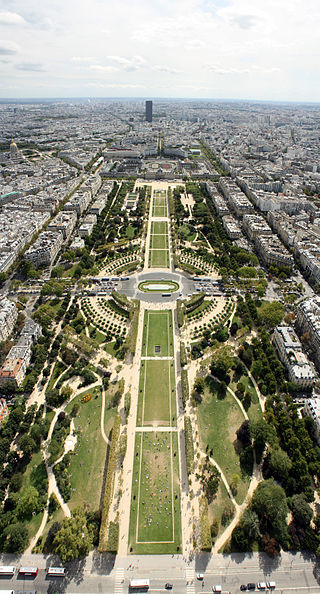
The Champ de Mars is a large public greenspace in Paris, France, located in the seventh arrondissement, between the Eiffel Tower to the northwest and the École Militaire to the southeast. The park is named after the Campus Martius in Rome, which was dedicated to the god Mars. The name alludes to the fact that the lawns here were formerly used as drilling and marching grounds by the French military.

The Campus Martius was a publicly owned area of ancient Rome about 2 square kilometres in extent. In the Middle Ages, it was the most populous area of Rome. The IV rione of Rome, Campo Marzio, which covers a smaller section of the original area, bears the same name.
Martius may refer to:
The Field of Mars Reserve is a protected nature reserve located on the northern suburbs of Sydney, in the state of New South Wales, Australia. The 50 Hectare reserve is a remnant of bushland situated between the Lane Cove and Parramatta rivers within the suburb of East Ryde and near Gladesville, Hunters Hill and Ryde.

Campus Martius Park is a re-established park in Downtown Detroit, Michigan. After the Great Fire of 1805, Campus Martius was the focal point of Judge Augustus Woodward's plans to rebuild the city. It was named for the principal square in Marietta, Ohio, the first capital of the Northwest Territory.

Campo de Marte Airport is the first airport built in São Paulo, Brazil, opened in 1929. It is named after Champ de Mars, in Paris, which in turn got its name from Campus Martius, in Rome.
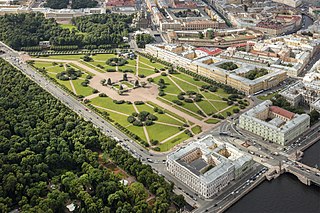
The Field of Mars is a large square in the centre of Saint Petersburg. Over its long history it has been alternately a meadow, park, pleasure garden, military parade ground, revolutionary pantheon and public meeting place.
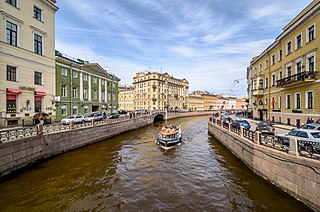
The Moyka is a short river in Saint Petersburg which splits from the Neva River. Along with the Neva, the Fontanka river, and canals including the Griboyedov and Kryukov, the Moyka encircles the central portion of the city, effectively making that area an island or a group of islands. The river derives its name from the Ingrian word Muya for "slush" or "mire", having its original source in former swamp. It is 5 kilometres (3 mi) long and 40 metres (130 ft) wide.

Downtown Montreal is the central business district of Montreal, Quebec, Canada.
Champ de Mars is a large public greenspace in Paris, France.
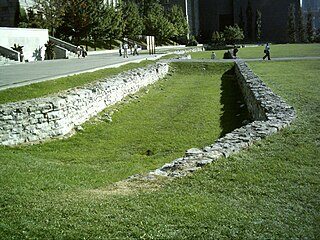
Champ de Mars is a public park in Old Montreal quarter of Montreal, Quebec, Canada.
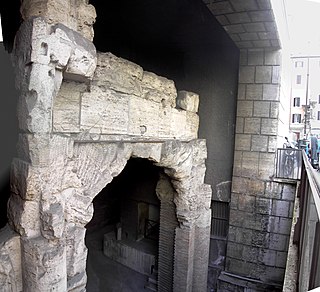
The Stadium of Domitian, also known as the Circus Agonalis, was located to the north of the Campus Martius in Rome, Italy. The Stadium was commissioned around AD 80 by Emperor Titus Flavius Domitianus as a gift to the people of Rome and was used almost entirely for athletic contests. In Christian tradition, Agnes of Rome was martyred there.

In ancient Roman religion and mythology, Mars is the god of war and also an agricultural guardian, a combination characteristic of early Rome. He is the son of Jupiter and Juno, and was pre-eminent among the Roman army's military gods. Most of his festivals were held in March, the month named for him, and in October, the months which traditionally began and ended the season for both military campaigning and farming.
Campus Martius may refer to:

Campo Marte is a venue under the administration of the Secretariat of National Defense (SEDENA). Named after the Campus Martius, it is used for military and government events, as well as equestrian events. Campo Marte is located next to the National Auditorium in Chapultepec Park, Mexico City.

The Castillo del Príncipe is a military fort located in the Loma de Aróstegui, in Havana, Cuba. In 1982, the fort was inscribed on the UNESCO World Heritage List, along with other historic sites in Old Havana, because of the city's importance in the European conquest of the New World, its fortifications, and its unique architecture.
Campo Marte, Campo de Marte, Campo di Marte or variant may refer to:
Aliso may refer to:

The Parque de la Fraternidad was built in the 1790s as a military practice range by the Spanish government, It was expanded in 1793 by Belgian engineer Agustin Cramer, and later Bishop Espada improved the lighting of the Campo. It was Captain General Don Miguel Tacón who included it within the scope of his embellishment program. The area was then fenced and four majestic gates, crowned with coats of arms, each representing an important personality: the north gate, Hernán Cortés; the south one, Francisco Pizarro; and the east and west gates, Captain General Miguel Tacón y Rosique (1834–1838), and Christopher Columbus respectively.
The Marchfield, later called the Mayfield, was an annual assembly of the Franks between the 6th and 8th centuries and of the Lombards in the 8th century.